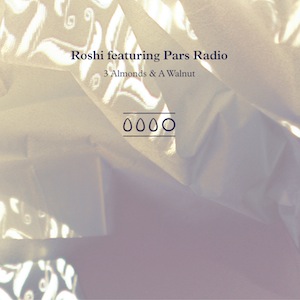Born in Wales, of Iranian descent, Roshi Nasehi is now an adopted Londoner and onto her second album of multicultural, city street surfing, soulful and subtle electro-pop with Pars Radio, AKA Graham Dowdall, AKA Graham Dids, AKA Gagarin- a musical facilitator whose previous collaborators include Pere Ubu, John Cale and Nico. Roshi’s music reflects her familial roots, drawing often on traditional Iranian music and sung when appropriate in Persian, or Farsi, as well as English, but also increasingly drawing on the sounds of her contemporary surroundings, though the beats and bass are restrained and function more in a painterly sense, as points in a landscape, less suited for a sweaty dancefloor than an mellow afternoon in a South London park.
The title track, sung in Farsi, apparently explores the irony of being an Iranian with a nut allergy, with Roshi’s vocals layered in rounds and creating almost a playground chant or skipping song over Dids’ sparingly deployed arrangements of beats, bass and keyboards. The gorgeous, electronica-flecked piano ballad ‘Nunhead Cemetery,’ with its impressionistic sense of place and bittersweet, wistful melancholy, evokes Saint Etienne. Roshi’s light, breathy vocals paint pictures with lyrics like "tall Victorian gravestones compete with the trees" and "the Canada Geese are strutting like a gang of hoodies…"
Another standout, ‘Postcard’, treads the gothic, post-punk, trip-hop faultline walked by Portishead, Tricky and Massive Attack, while the lyrics conjure a David Lynch-like ambience of everyday objects lent strange and terrible significance, layers of sub-bass and skittering pulses increasing the sense of mounting dread. "A chocolate bar melts along the grass- the tower falls another inch." Richard Thomas’ greasy cello adds to the unease. Previous single, the wonderfully-titled ‘Don’t breathe it to a soul but Amarilly is getting gay with a dude,’ is one of a couple of tracks on this album that was originally commissioned for a live score to the Mary Pickford-starring silent film Amarilly of Clothes Line Alley at the 2012 WOW Festival on London’s South Bank. Dreamy, hypnotic and candy-floss light, with an unsettling undercurrent, it contrasts with the urban makeover given to the traditional Iranian folk song ‘Aziz Joon,’ here underpinned with pothole carving bass and echoing industrial kettle drums.
Yet for all its bold experimentation, Three Almonds and a Walnut is, in the best sense, a potential pop album; accessible and emotionally literate, and definitely deserving to be heard outside of the dry circle of Wire magazine readers and laptop DJs most likely to pick up on it. It snakes through humid summer afternoons and into the relative cool of evening as naturally as a tall gin and it, and who could fail to be seduced by ‘Strip’, a, well, stripped-down torch song that loses none of its classic form as Roshi’s restrained vocal soars sorrowfully over minimal synthesiser chords and artfully manipulated hi-hat beats? The everyday minutiae of London life is expertly, if appropriately hazily, observed on ‘Opium,’ an English drug song one could imagine a contemporary Syd Barrett weaving (while sounding nothing like all the legions of retro Syd wannabes). ‘Pache Leili’ sounds almost like a glitch-driven reworking of Art of Noise’s ‘Moments in Love’, and ‘We Don’t Talk Well’ is a pure kitchen sink pop gem that Lily Allen would kill for, a soft, soulful skip across the pulsing pirate radio waves.
Ultimately, these are classic songs that transcend any "exotic" or "culture-clash" boundaries we might want to place around them. Modern and true to themselves, they remain outside of the mainstream for now, but this album requires no special effort to enjoy. Please seek it out; in an ideal world, it will be heard coming out of car radios and pavement café windows the whole summer long, and beyond.


